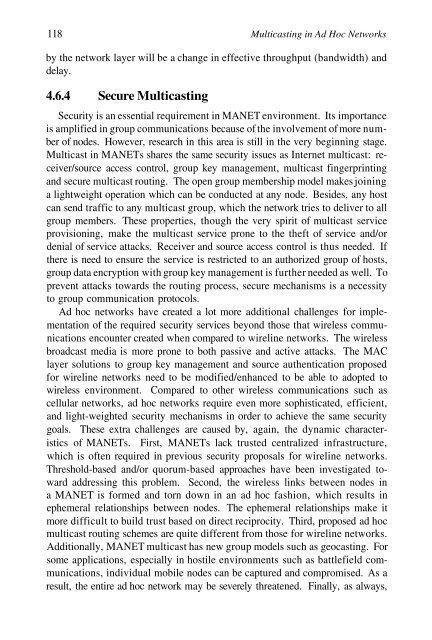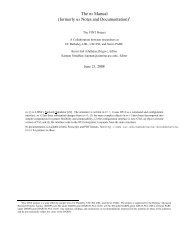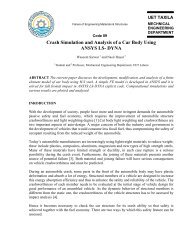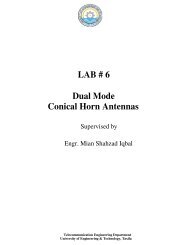Ad Hoc Networks : Technologies and Protocols - University of ...
Ad Hoc Networks : Technologies and Protocols - University of ...
Ad Hoc Networks : Technologies and Protocols - University of ...
You also want an ePaper? Increase the reach of your titles
YUMPU automatically turns print PDFs into web optimized ePapers that Google loves.
118 Multicasting in <strong>Ad</strong> <strong>Hoc</strong> <strong>Networks</strong><br />
by the network layer will be a change in effective throughput (b<strong>and</strong>width) <strong>and</strong><br />
delay.<br />
4.6.4 Secure Multicasting<br />
Security is an essential requirement in MANET environment. Its importance<br />
is amplified in group communications because <strong>of</strong> the involvement <strong>of</strong> more number<br />
<strong>of</strong> nodes. However, research in this area is still in the very beginning stage.<br />
Multicast in MANETs shares the same security issues as Internet multicast: receiver/source<br />
access control, group key management, multicast fingerprinting<br />
<strong>and</strong> secure multicast routing. The open group membership model makes joining<br />
a lightweight operation which can be conducted at any node. Besides, any host<br />
can send traffic to any multicast group, which the network tries to deliver to all<br />
group members. These properties, though the very spirit <strong>of</strong> multicast service<br />
provisioning, make the multicast service prone to the theft <strong>of</strong> service <strong>and</strong>/or<br />
denial <strong>of</strong> service attacks. Receiver <strong>and</strong> source access control is thus needed. If<br />
there is need to ensure the service is restricted to an authorized group <strong>of</strong> hosts,<br />
group data encryption with group key management is further needed as well. To<br />
prevent attacks towards the routing process, secure mechanisms is a necessity<br />
to group communication protocols.<br />
<strong>Ad</strong> hoc networks have created a lot more additional challenges for implementation<br />
<strong>of</strong> the required security services beyond those that wireless communications<br />
encounter created when compared to wireline networks. The wireless<br />
broadcast media is more prone to both passive <strong>and</strong> active attacks. The MAC<br />
layer solutions to group key management <strong>and</strong> source authentication proposed<br />
for wireline networks need to be modified/enhanced to be able to adopted to<br />
wireless environment. Compared to other wireless communications such as<br />
cellular networks, ad hoc networks require even more sophisticated, efficient,<br />
<strong>and</strong> light-weighted security mechanisms in order to achieve the same security<br />
goals. These extra challenges are caused by, again, the dynamic characteristics<br />
<strong>of</strong> MANETs. First, MANETs lack trusted centralized infrastructure,<br />
which is <strong>of</strong>ten required in previous security proposals for wireline networks.<br />
Threshold-based <strong>and</strong>/or quorum-based approaches have been investigated toward<br />
addressing this problem. Second, the wireless links between nodes in<br />
a MANET is formed <strong>and</strong> torn down in an ad hoc fashion, which results in<br />
ephemeral relationships between nodes. The ephemeral relationships make it<br />
more difficult to build trust based on direct reciprocity. Third, proposed ad hoc<br />
multicast routing schemes are quite different from those for wireline networks.<br />
<strong>Ad</strong>ditionally, MANET multicast has new group models such as geocasting. For<br />
some applications, especially in hostile environments such as battlefield communications,<br />
individual mobile nodes can be captured <strong>and</strong> compromised. As a<br />
result, the entire ad hoc network may be severely threatened. Finally, as always,

















